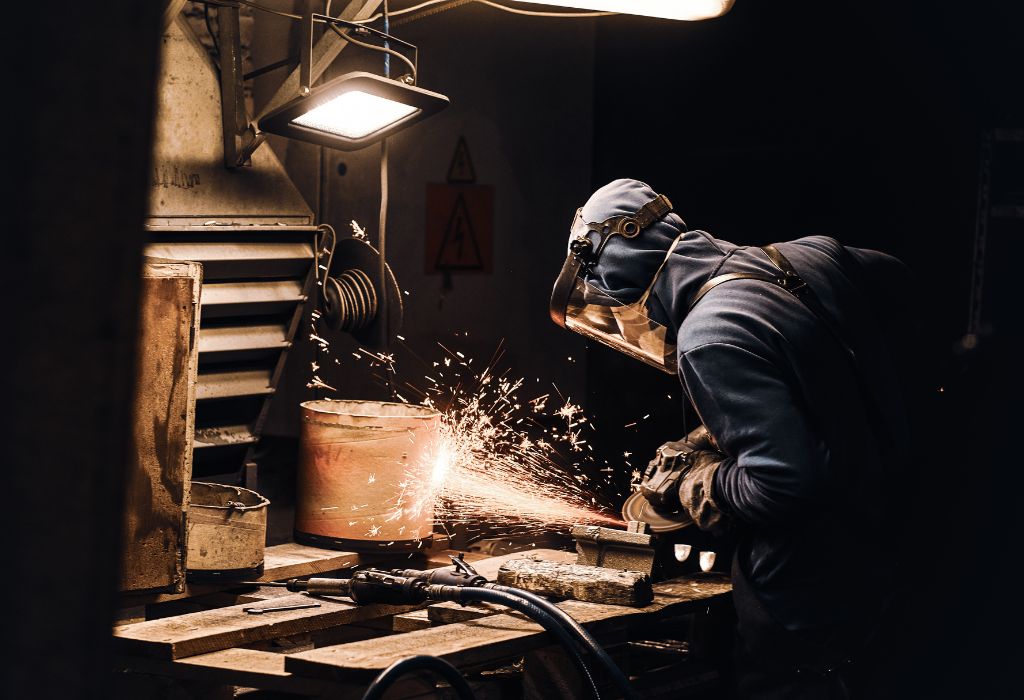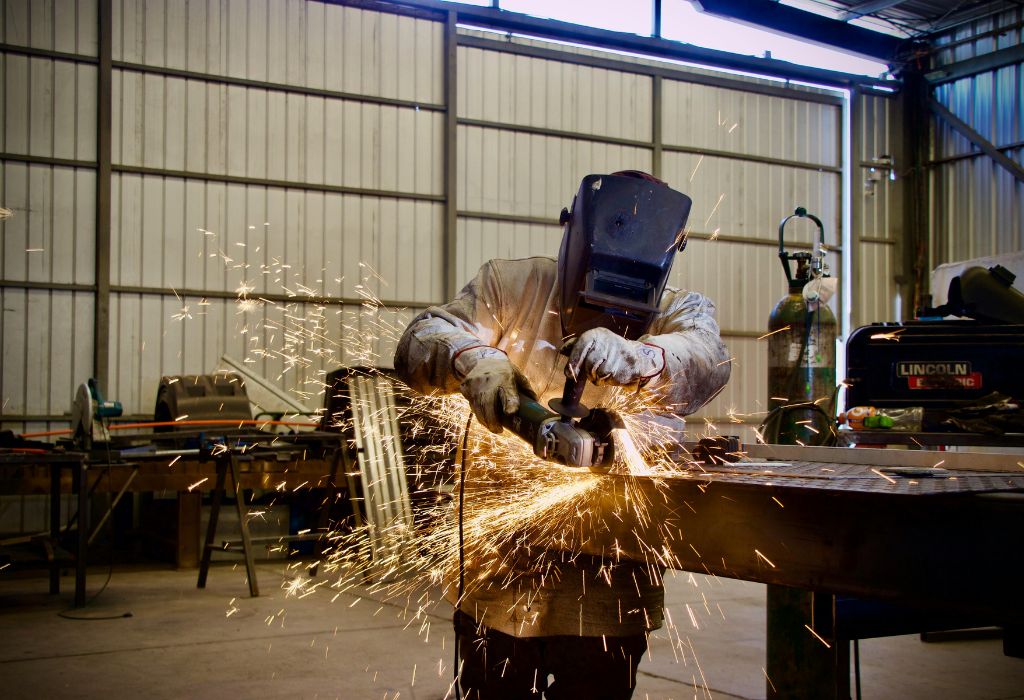A welder steps into a Denver fabrication shop at sunrise, the torch sparking to life. For many in Colorado, welding is more than a trade — it is a career that promises steady work and the potential for strong earnings.
Yet one question remains constant for apprentices, journeymen, and seasoned professionals: how much does a welder make in Colorado?
The answer depends on factors ranging from location and industry to certifications and experience.
A welder in Denver or the Northern Front Range may earn more than someone in smaller towns, while those skilled in pipe welding or code work often command higher paychecks.
Confusion often arises because job postings list hourly rates, annual salaries, and overtime opportunities differently, leaving workers unsure how their earnings compare statewide.
According to the U.S. Bureau of Labor Statistics, the national median wage for welders was about $51,000 in 2024 (BLS).
Colorado welders tend to fall in a slightly higher range, with many earning between $21 and $26 per hour, or roughly $50,000 to $55,000 annually, before overtime and bonuses (Indeed).
Top earners in specialties like pipe welding, aerospace TIG, and union projects often exceed $70,000.
Understanding how Colorado compares with national averages, how pay varies across cities, and which skills increase income is essential for anyone entering or advancing in the trade.
This guide provides a clear breakdown of salary data, industry insights, and future job outlooks to help welders make informed career decisions.
The Short Answer: How Much Does a Welder Make in Colorado?

Most welders in Colorado earn $21–26 per hour, which equals $50,000–55,000 per year before overtime. This places them slightly above the U.S. median.
Top welders working in industrial, energy, or aerospace sectors can exceed $65,000–70,000 with overtime, per diem, and shift differentials.
What’s the statewide average hourly pay?
It typically falls between $23 and $26/hr.
What’s the annual average salary?
Around $50,000–55,000, depending on industry and city.
Is Colorado higher than national pay?
Yes, slightly above the U.S. median of $51,000.
Do top welders break $70k?
Yes, especially with pipe welding or shutdown work.
Are benefits included in these numbers?
No, benefits packages add further value.
Pay by City: Denver, Colorado Springs, Northern Front Range, Western Slope
Pay in Colorado is not uniform. Welders in Denver enjoy the highest averages due to heavy demand in fabrication, construction, and aerospace.
Colorado Springs and Northern Front Range regions follow closely, with averages near $24–25/hr. The Western Slope offers varied pay, often tied to energy and mining projects.
How much do Denver welders earn?
About $27/hr on average (Indeed).
Is Colorado Springs lower?
Yes, often around $24–25/hr.
What about the Northern Front Range?
Close to Denver wages, especially near Fort Collins.
Do mountain towns differ?
Yes, wages vary by project, sometimes with per diem.
Which area has most job postings?
Denver and the Front Range corridor.
Experience Ladder: Entry-Level to Journeyman

Entry-level welders in Colorado typically start at $18–22/hr. With 2–3 years of experience and certifications, pay climbs into the mid-$20s.
Journeyman welders and lead fitters often command $27–30/hr, with higher totals during busy project seasons.
What is the entry-level rate?
Usually $18–22/hr.
How fast can pay grow?
Within 2–4 years with added certifications.
What do journeymen earn?
Mid-$20s per hour or more.
Do certifications accelerate raises?
Yes, especially code qualifications.
Does loyalty to one shop matter?
Yes, longer tenure often leads to steady raises.
Specialty Roles That Pay More
Some welding roles pay far above the state average. Pipe welders, 6G-certified professionals, and aerospace TIG welders are in high demand.
Shutdown projects, union contracts, and oilfield construction also offer premium wages plus overtime and per diem.
Which role pays most?
Pipe welders with 6G certification.
Do union jobs pay more?
Yes, often higher hourly plus benefits.
Are shutdowns lucrative?
Yes, with heavy overtime and bonuses.
Does aerospace welding pay extra?
Yes, precision TIG welders are well compensated.
Do certifications increase pay?
Absolutely, advanced certs drive higher wages.
Industry Breakdown: Fabrication, Construction, Energy, Aerospace
Fabrication shops provide steady work with moderate pay. Construction projects can offer higher wages but vary by season.
Energy and mining jobs on the Western Slope and plains offer premiums, while aerospace and defense in Denver demand high-skill TIG welders with strong pay.
Which industry pays most?
Energy and aerospace projects.
Is fabrication lower paying?
Yes, but it offers consistency.
Are construction jobs seasonal?
Yes, with overtime during peaks.
Do aerospace welders need clearance?
Often, for defense-related work.
Is mining welding stable?
It fluctuates with commodity cycles.
Hourly vs Annual: Overtime, Shifts, and Per Diem
Many welders in Colorado increase earnings through overtime, night shifts, and travel per diem. A $25/hr welder working 10 hrs OT per week could add $10k–15k annually.
Travel jobs often pay per diem, covering food and lodging, effectively raising take-home pay.
How much does OT add?
Thousands per year during busy seasons.
Do night shifts pay more?
Yes, with differential bonuses.
Is per diem common?
Yes, on travel-heavy projects.
Should pay be viewed hourly or annually?
Always calculate both for accuracy.
Can annual pay exceed expectations?
Yes, with OT and travel jobs.
Skills and Certifications That Boost Pay
Welders with 6G pipe certification, TIG skills, or ASME/API code qualifications earn more than general welders.
Certifications in SMAW, GTAW, and FCAW are highly sought after. Employers pay premiums for welders who pass rigorous procedure tests.
Which cert pays most?
6G pipe certification.
Does TIG matter?
Yes, especially for aerospace and stainless.
Are multi-process welders valued?
Yes, versatility raises pay.
Do blueprint skills matter?
Yes, layout and fit-up add value.
Does safety training affect pay?
Yes, OSHA and rigging certs improve prospects.
Cost of Living and Take-Home Pay

Colorado’s cost of living varies widely. Denver housing is expensive, while Colorado Springs and smaller towns are more affordable.
Per diem jobs help offset housing costs, and welders must budget for tools, PPE, and commuting.
Is Denver costly?
Yes, higher than state average.
Is Colorado Springs cheaper?
Yes, with slightly lower housing.
Do per diem jobs help?
Yes, by covering food and lodging.
Are tool costs significant?
Yes, welders often buy their own.
Does commute affect pay?
Yes, long commutes reduce net income.
2025 Outlook: Demand and Hiring
Demand for welders in Colorado is stable with growth in construction, aerospace, and renewable energy projects.
The Bureau of Labor Statistics predicts steady nationwide demand, with Colorado offering strong opportunities in industrial sectors.
Is demand growing in Colorado?
Yes, especially in construction and energy.
What is the job outlook nationally?
Stable, with modest growth expected.
Do aerospace projects boost demand?
Yes, Denver is a hub.
Are new welders needed?
Yes, retirements are creating openings.
Will wages rise in 2025?
Likely in specialty and union sectors.
Conclusion
So, how much does a welder make in Colorado? Most welders earn $21–26 per hour, or $50,000–55,000 annually, with top earners surpassing $70,000 through specialties, overtime, and per diem.
Denver pays the most, while certifications and specialty skills push wages higher across the state. Welders who invest in training and target high-paying sectors will find Colorado to be a rewarding place to build a long-term career.

I’m Darrell Julian, the founder, lead writer, and hands-on welding enthusiast behind ArcWeldingPro.com. With more than 15 years of real-world welding experience, I created this platform to share what I’ve learned in the field, in the shop, and in the heat of the arc.


